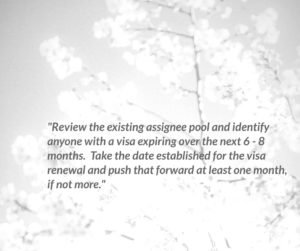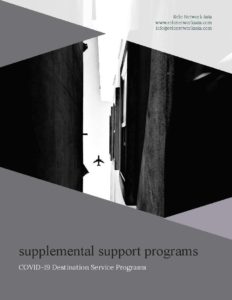Part I defined the Now Normal and its general themes, a place we anticipate being until the end of 2021. Part II of this four-part series explored considerations for assignments during this timeframe.
In this post, we will examine considerations for estimating how assignments may need to be adjusted based upon the current time it takes to get things done.
These days every procedure has a few new steps and additional complications. Any previous timeline is now unreliable and can be thrown out the window. In general, it seems obvious that the timeline will be longer but assessing how much longer will be difficult.
Visa and Immigration
First, the visa process itself can experience delays even after anticipating lengthened expectations. Backlogs from the lockdowns will slow timelines and cause governments the need to prioritize processing when it resumes. There continue to be disruptions to immigration offices due to local lockdowns, while ongoing outbreaks have led to the closure of consulate locations around the globe. Many countries are selecting to first address foreigners who have until recently been on auto-extended visas due to the inability to travel.
 Assignees with approved visas who are “on hold” and waiting to enter the country may be positively or negatively impacted by the local government decisions on whether to extend visas until travel can be permitted or cancel them in line with existing travel bans. In some cases, already approved visas that have expired while borders were closed are being provided a fast-track to procuring a new visa. Recently, China has become one of the first countries to permit those with existing visas and residence permits to reenter without applying for a new visa. Note that the time from the start of the virus in China in January to this news was approximately eight months.
Assignees with approved visas who are “on hold” and waiting to enter the country may be positively or negatively impacted by the local government decisions on whether to extend visas until travel can be permitted or cancel them in line with existing travel bans. In some cases, already approved visas that have expired while borders were closed are being provided a fast-track to procuring a new visa. Recently, China has become one of the first countries to permit those with existing visas and residence permits to reenter without applying for a new visa. Note that the time from the start of the virus in China in January to this news was approximately eight months.
As local economies struggle, anticipate protectionist actions, including changes to visa requirements. Increases in minimum salaries and conditions for advertising or extended advertising of positions locally before filling them with a foreigner are standard tools governments use to support local hiring. Changes to the percentage of local vs. foreign employees can be enacted as well. We are starting to see an increase of updated requirements in these areas.
Travel & Transportation
Even when all the approvals are in place, the physical logistics of getting the people and possessions to the destination have changed. Overall, as of September, the year over year change of weekly flight frequency was down by almost 50% globally. In international flight hubs such as Singapore and Hong Kong, flight reductions were 94% and 89%, respectively.
There are limited flights between countries now merely due to flight bans. These limitations will continue even after borders open as the airline industry rebuilds. In many instances, international flights are being directed to a limited number of airports, such as in Japan, when all international flights were required to land only at Narita airport. The final destination for the assignee may be elsewhere in the country. However, quarantine in Asia is usually required to take place at the port of entry, and transportation to the new location would then be required post-release.
Emerging challenges, including the availability of approved quarantine spaces, will also substantially impact the permissible amount of daily entries to a country. Singapore has added a step after the In-Principle Approval letter is received to help control the flow of arrivals. Entrees must seek approval from the Ministry of Manpower (MOM) for permission to enter Singapore. If consent is granted, a window of time for permitted arrival will be provided. Travelers must enter during these dates, and if a flight is not available or canceled, a new application process must be undertaken. That may seem restrictive, and it is, but countries must balance the ability to enact their safety precautions with the openness of their borders. Earlier in 2020, Australia demonstrated how disruptive it could get when the two are out of alignment when Victoria ran out of quarantine facilities. The result was canceled flights and diversions of incoming traffic to other cities.
Restricted borders around the world have impeded the shipping of household goods. There will be delays and backlogs to work through at ports of entry, and further delays could be caused by prioritization of critical shipments over personal belongings. Many import procedures are tied to residency or visa status. If the assignee has not yet or is not able to arrive in country, the arrival and delivery of shipments can be impacted. Additional storage could be required either at the origin or the destination. Delays in personal goods can cascade into the extension of temporary serviced apartments and potentially duplicate destination housing costs if a new lease has already been signed.
 We have already published several pieces regarding the additional complications surrounding the delivery of destination services and the impact to the assignee experience. One which shows little sign of abatement is the challenges of meeting the requirement for COVID pre-boarding testing. Getting the test completed in what is often a 72-hour window prior to the flight is an issue in some locations. Walking in off the street to get a test is still not possible in most locations around the world. Our team is advising on a case-by-case basis when and where we believe an existing benefit will not be sufficient, and additional time may be required. We have also created supplemental service programs to provide the newly mandated assignee support through today’s complicated arrival and quarantine processes.
We have already published several pieces regarding the additional complications surrounding the delivery of destination services and the impact to the assignee experience. One which shows little sign of abatement is the challenges of meeting the requirement for COVID pre-boarding testing. Getting the test completed in what is often a 72-hour window prior to the flight is an issue in some locations. Walking in off the street to get a test is still not possible in most locations around the world. Our team is advising on a case-by-case basis when and where we believe an existing benefit will not be sufficient, and additional time may be required. We have also created supplemental service programs to provide the newly mandated assignee support through today’s complicated arrival and quarantine processes.
Our next and final contemplation on this topic will further explore the Now Normal and what considerations may be required for existing and new relocation cost projections.





